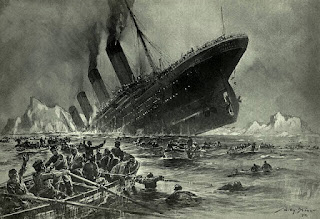Titanic Tragedy And Titanic Film :
The sinking of the Titanic is one of the most infamous disasters in history. On April 14, 1912, the largest and most luxurious ship of its time hit an iceberg and sank, taking the lives of over 1,500 people. The tragedy has been the subject of countless books, films, and documentaries, but what really happened on that fateful night?
The Titanic was on its maiden voyage from Southampton, England, to New York City, carrying over 2,200 passengers and crew. The ship was equipped with state-of-the-art technology and safety features, including watertight compartments and lifeboats, and was considered unsinkable by many. However, on the night of April 14, the ship's lookouts spotted an iceberg in its path, but it was too late to avoid a collision.
The iceberg scraped along the side of the ship, puncturing several of its watertight compartments and causing water to flood into the lower decks. The crew worked to contain the flooding and evacuate passengers onto the lifeboats, but there were not enough lifeboats for everyone on board. In the chaos and confusion, many of the lifeboats were launched only partially filled, leaving hundreds of passengers stranded on the sinking ship.
As the ship began to sink, panic and chaos erupted on board. Passengers scrambled to find a way to safety, while crew members struggled to maintain order and launch the remaining lifeboats. The freezing cold water and lack of lifeboats meant that many people died of hypothermia or drowned in the icy ocean.
The aftermath of the disaster was devastating. The Titanic's owners, White Star Line, faced widespread criticism for the lack of lifeboats and other safety measures, and an official inquiry was launched to investigate the cause of the sinking. The tragedy also had a profound impact on maritime safety regulations, with new laws requiring ships to carry enough lifeboats for everyone on board and to conduct regular safety drills.
The sinking of the Titanic is a stark reminder of the fragility of human life and the importance of safety measures in the face of disaster. The tragedy has become a symbol of human hubris and the dangers of overconfidence, and continues to captivate and haunt people over a century later.
James Cameron's 1997 film "Titanic" is one of the most successful and beloved films of all time. It tells the story of a fictional romance between a young aristocrat, Rose DeWitt Bukater, and a poor artist, Jack Dawson, who meet aboard the ill-fated ship. The film stars Kate Winslet as Rose and Leonardo DiCaprio as Jack, and also features a talented ensemble cast that includes Billy Zane, Kathy Bates, and Gloria Stuart.
"Titanic" was a massive production that took several years to make and cost over $200 million to produce. Cameron was determined to make the most accurate and realistic portrayal of the ship and its sinking ever put on film, and he spared no expense to achieve this goal. The film used groundbreaking visual effects and a mix of practical and digital effects to create stunning and memorable scenes, such as the ship's grand staircase and the climactic sinking sequence.
The film was a critical and commercial success, winning 11 Academy Awards, including Best Picture and Best Director. It was also a box office sensation, grossing over $2 billion worldwide and becoming the highest-grossing film of all time until Cameron's own "Avatar" surpassed it in 2010.
"Titanic" has become a cultural phenomenon, and its impact on popular culture cannot be overstated. It inspired a resurgence of interest in the history of the Titanic, as well as the stories of the people who were on board. It also launched the careers of several young actors, including Winslet and DiCaprio, who went on to become major stars.
Despite some criticisms of its historical accuracy and the romantic storyline, "Titanic" remains a beloved classic that has touched the hearts of millions around the world. Its themes of love, sacrifice, and tragedy continue to resonate with audiences, and it has become a timeless masterpiece that will be remembered for generations to come.










0 Comments